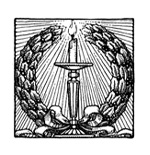
The Forgotten Martyr
JOSEPH CHIHWATENHA, HURON CATHOLIC
One of the most famous chapters in Church history involves the heroic martyrdom of the French Jesuit missionaries to North America. Saints like Jean de Brebeuf and Isaac Jogues continue to inspire us centuries after their deaths. But a story rarely told is that of an Indian martyr who preceded them in giving his life for the faith. His name was Joseph Chihwatenha and he was a convert of the Huron tribe who became the cornerstone of the emerging Huron Church.
When the Jesuit missionaries first arrived, they were greeted by the Huron with a mixture of emotions: curiosity, fear, awe, and, in some cases, love. But these initial reactions quickly yielded to another: suspicion. The Huron perception of the Jesuits was influenced by the appearance of another strange arrival, that of a highly contagious and deadly disease. This disease, commonly identified as smallpox, swept through the Huron villages in a series of epidemics between 1634 and 1640. The Huron looked on in horror, helpless as friends and family died slow and painful deaths. At the end of those six years, over fifteen thousand people, approximately half the Huron population, had succumbed to the disease.
The natural remedies the Huron concocted could not stop the epidemic. It spread despite the time-honored treatments of their most powerful medicine men. Having found no cure, the Huron concluded that there could be only one cause. It was the cause that the Huron feared most: The disease must be the result of a powerful and malignant witchcraft.
The obvious suspects were the newly arrived Jesuits. The Huron asked one simple question: “Why do these men desire so strongly to live with us?” The Jesuits had endured great hardships to reach the Huron land. What could be the purpose of such a strenuous undertaking? The Huron concluded that the Jesuits could have only one motivation: They intended to wipe out the entire Huron population using their powerful witchcraft. One of the missionaries, Jerome Lalemant, wrote of this perception:
The climax of it is, that the most intelligent among these poor Barbarians, not being able to comprehend the object and motive that have caused us to leave France and come so far, with so much difficulty and labor, and not seeing us claim any profit or advantage from our residence among them, conclude that we must, therefore, desire their ruin, since we can only aim at some object of great importance in such resolution.
Incriminating evidence quickly accumulated against the Jesuits. Not only did the onset of the disease coincide with their arrival, but wherever they went, the disease followed. “It has been remarked more than a hundred times,” Lalemant was forced to admit, “that where we were most welcome, where we baptized the most people, there it was where they died the most: and in the cabins to which we were denied entrance, at the end of a few days one saw every person cured.” Even more incriminating, the Jesuits themselves did not contract the disease. While the Huron were dying by the thousands, not one missionary died. Jesuit Francois Le Mercier remarked that the Huron did not fail to notice this and “were astonished at it, and are still astonished every day, saying in reference to us, ‘Those people are not men, they are demons.'”
You May Also Enjoy
The question of a theology teacher’s basic attitude toward the Church is a deep one, and crucial.
Clare Boothe Luce wrote that most converts, like herself, "enter God's kingdom through the gates of pain."
Scott asked a theologian: "What for you is the pillar and foundation of truth?" Answer: "The Bible, of course!" Scott continued, "Then why does the Bible say in 1 Timothy 3:15 that the Church is the pillar and foundation of truth?"

